- London based Karishma Manwani talks about what it
takes to organize an Indian wedding, destination wedding locales in Europe,
role and qualities of a wedding planner and how she makes foreigners part of
Indian weddings.
A close friend was invited to the wedding of his cousin’s son in the Canary Islands. Though it is part of Spain it is closer to Morocco. He returned praising the wedding arrangements and the great time they had. When he told me the wedding planner was Indian, Karishma Manwani, I got curious.
I had an
interesting chat with Karishma covering her journey from Mumbai to London via
Canary Islands, how she got into wedding planning, what it takes to organize a wedding
and be a wedding planner, role of a wedding planner, destination wedding
locations in Europe, what is common between a Tamilian and North Indian
wedding, how she makes foreigners relate to Indian weddings and stays connected
with India.
In a nutshell her story is one of listening to your
inner voice, grabbing every opportunity that comes your way, being fearless and
a good listener.
Q1. You were born in Mumbai so how did you land up
here and what was it like growing up in Spain?
KM My Dad was in the visa and travel business back in Mumbai and had helped several friends to move abroad. To thank him, one of his friends invited him to visit him in the Canary Islands and so he did. He came back from his holiday and told my mum “Pack your bags, I have found Paradise!” – I was only one. And so, we moved to the Canary Islands.
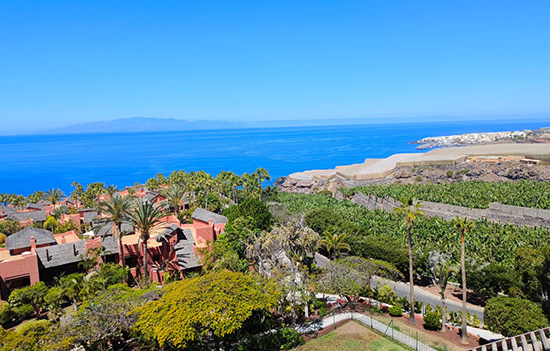 Canary Island
Canary Island
I had an idyllic childhood growing up in the Canary Islands. Tenerife is known as the island of eternal Spring and we only had good weather, I didn’t even know what the different seasons looked like in real life and thought they only existed in books. We were always outside, went swimming every day, met up with friends by the beach, and played all sorts of sports. It was very safe for us to be outside without adult supervision so we didn’t have to wait for our parents to take us, we could just be out and about. I always tell my parents that moving to Spain was one of the best decisions they made.
Q2. Through these
years have you kept India connect alive and how?
KM Tenerife
has a large Sindhi community. When I was growing up, we were 500 Indian
families. We had a temple in our building where we gathered every Saturday to
pray and sing Bhajans. All the Indian families there were in a similar
situation, away from their home country, parents, cousins, and traditions, so I
guess we tried harder to keep that connection to India alive. We celebrated
every event in the Indian calendar be it Navratri, Ganpati, Diwali,
Janmashtami, Karwa Chauth and Teejri. The
whole community would come together so it kept us very close to each other and
our roots.
I did go back to India every few years with our parents to visit family but it wasn’t until 2014 when I fell in love with India.
I had just planned my first Marwari/Gujarati wedding in Tenerife for a couple from India. It was at their wedding when someone told me – “If you ever want experience, come to Mumbai” – and that stuck with me. I was eager to learn and understand the intricacies of an Indian wedding and I couldn’t think of a better way than going to India and seeing how they are.
So in October 2014, I landed in the city where everyone’s dreams come true. The next nine months would become the best months of my life. I met the nicest people, and planned some of the most amazing weddings. Mumbai and its people just took me in as one of their own.
And then just before coming back to Spain, I travelled across the north of India. We went from Jaisalmer to Darjeeling, stopping in every city we could for 17 days, spending our nights in trains and the days exploring India. It was truly a beautiful experience, we received the best hospitality and everyone went out of their way to ensure we were looked after. Since then, I go back to India every year – you know that pull you get when you are away from home, that’s the feeling I have if I don’t go back for some months.
I spend time in Mumbai where I have my closest friends and then I spend some time exploring different parts of India. It’s incredible how everything changes when you go from one city to another, the food, the clothes, the dialect – it’s like being in a new country. On one of my trips, I went from Kashmir to Kerala in less than 10 days and the contrast was incredible.
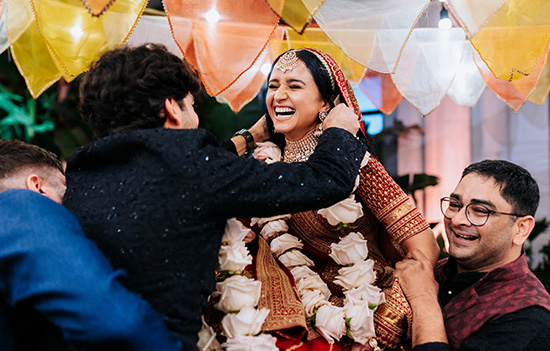 Exchange of garlands at wedding.
Exchange of garlands at wedding.
Q3. What took you from Spain to London?
KM After coming back from India, I knew this was the career I wanted to have. Before getting into the wedding industry, I was studying Medicine in Tenerife. However, I didn’t want to go back to that. So I thought I would study Event Management and I found a degree offered by Greenwich University in London.
So I landed in London in August of 2015 to study event
management, but things took a slight turn. I was robbed before leaving India
and so I had to get a job to pay for my tuition and expenses. I spoke to the
university and they suggested I start the course in January which would allow
me a few months to sort everything out.
I reached out to my small network and mentioned I was
in London and if they came across any opportunities, to kindly share them.
As soon as my text went out, minutes later, my first bride’s dad introduced me to a couple who was also getting married in Tenerife (same hotel as Anand and Megha) in the next two months. They were in desperate need of a wedding planner who knew the island and hired me straight away. Their wedding was a huge success and during their departures, I had three couples wanting to hire me for their wedding. By the time January came, I had signed up six weddings for that year so I decided to focus on setting up my business instead of studying.
I remember speaking to the university and they were like-you have the experience and contacts, what are we going to teach that you don’t already know-and they were so right.
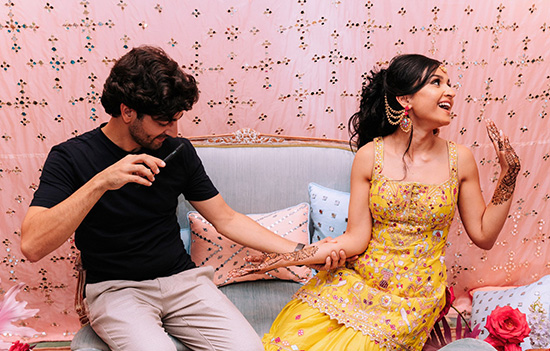 Looking for his name in the Mehendi.
Looking for his name in the Mehendi.
Q4. Why and how “wedding
planning”?
KM Wedding planning was never part of ‘the plan’.
My parents, as good Indians, brought me up saying I would become a Doctor and I did try, I studied 4.5 years of Medicine but from day 1 of university, it was clear that my heart was not in it. Tenerife is a small island and back then, there weren’t many opportunities so I carried on studying until something better came up.
And then one day, I met with a couple who wanted to get married at The Ritz-Carlton, Abama in Tenerife. The bride was from Delhi and the groom was from Antwerp, they were planning a destination wedding but were having problems finding the right vendors due to the language barrier. I offered my help and was initially hired as their local translator, someone who would support their wedding planners and designers from India. A few months later, my bride asked if I could plan the wedding and she wouldn’t bring her planners from India and I was like, “Yes of course!”
Then, a month later, her mum asked if I could decorate the wedding and she wouldn’t bring her decorators from India and again, I was like, “Yes of course!” You know when you are young and not afraid of anything... that was me at the age of 22 saying yes to what was going to become the biggest wedding in the Canary Islands to date! A big Marwari and Gujarati wedding with 700 guests flying
in from across the world, 30 chefs from Delhi, 770 kilos of utensils and spices
were brought in and there I was one moment standing with the airport
authorities clearing it all through customs, another moment managing a team of
15 and then supervising the event setup and managing every event.
I had so much fun, everyone around me was so happy, the guests were enjoying themselves, everything looked stunning and my couple was over the moon. My first experience was so amazing, it was hard not to pursue it. And that’s where the wedding planning journey started.
That same year, I moved to Mumbai and worked for Cineyug, where I planned some amazing weddings with guest lists that crossed 7000 guests and learnt everything before moving to London where I set up my own company. It’s been nine years since my first wedding took place and I have never looked back.
Q5. Which are the places in Europe where you organize weddings?
KM
Spain – it is home for me and I love bringing couples here. Good food, great weather, and the Mediterranean lifestyle are the highlights. You instantly feel like you are on holiday when you land in Spain.
Portugal – is a charming country with some of the nicest people, you feel their warmth. Every supplier puts their heart into the wedding.
Italy – is so picturesque with some of the most stunning venues and landscapes in the world and they have pizza!
England – the British countryside is really beautiful. There is so much history and character around you, it truly offers a majestic setting for a wedding.
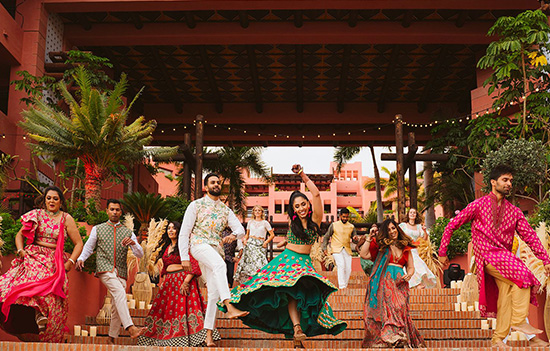 Sangeet dances.
Sangeet dances.
Q6. Within the Indian
wedding space which parts of India do cater to?
KM We
cater to all Indian weddings and interfaith weddings where only one side is
Indian. Within Indian we do Gujarati, Sikh, Tamil, and Sindhi weddings.
Q7. What were the challenges you faced in the initial years
of starting?
KM Wedding planning is a fairly new profession and many don’t understand the role of a wedding planner.
When I started, I remember a lot of the mums would think that they could easily plan their daughter’s wedding and didn’t need me but would return after a few months. Explaining our role and the value we provide to our clients was the biggest challenge unless you were happy to charge very little for your services – but then they didn’t value you.
I was extremely lucky that I had experience with destination weddings. When I started, destination weddings were a new thing in the UK so there weren’t many planners who were offering this service so I was able to get clients without too much difficulty. Plus, I was from Spain and spoke Spanish. Spanish don’t speak much English which played in my favour as anyone wanting a wedding in Spain had to hire a wedding planner.
Q8. Did the Indian community help in your start-up years?
KM No.
Some didn’t think a young girl was able to do it. Others tried to use my name to get themselves clients, they would say I work for them and when they had the client, they wouldn’t call me.
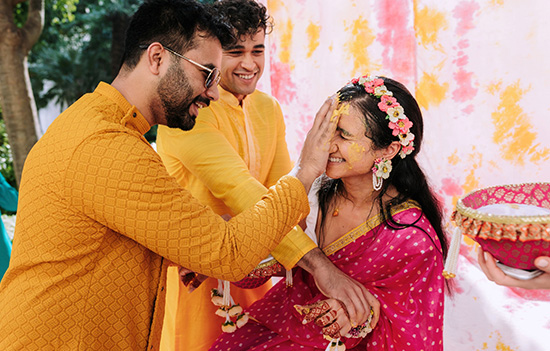 Haldi ceremony.
Haldi ceremony.
Q9. Are your clients mainly Non-Resident Indians or even
Resident Indians?
KM Non-Resident Indians
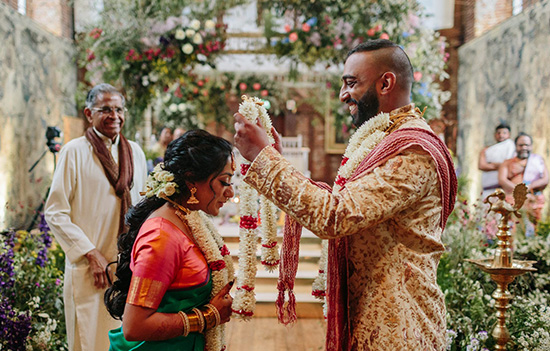 Varmala.
Varmala.
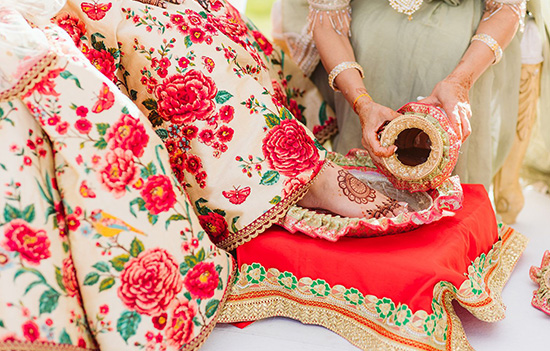 Kanya Pooja
Kanya Pooja
Q10. Give two examples of what is common between a Tamilian
and North Indian wedding.
KM Both
take pheras and have the mangalsutra ceremony. Tamils call their mangalsutra Thali.
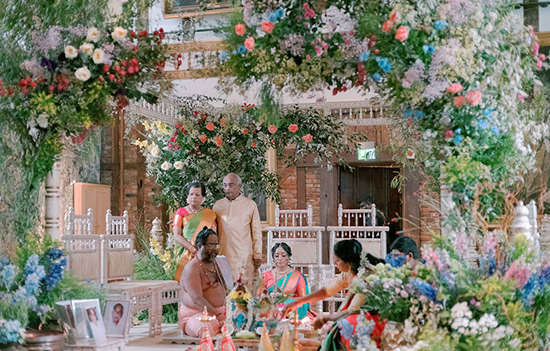 Tamil wedding
Tamil wedding
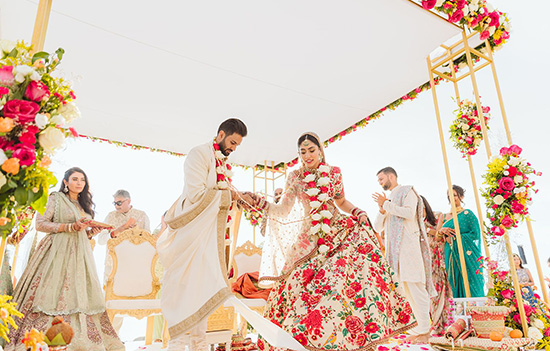 Pheras.
Pheras.
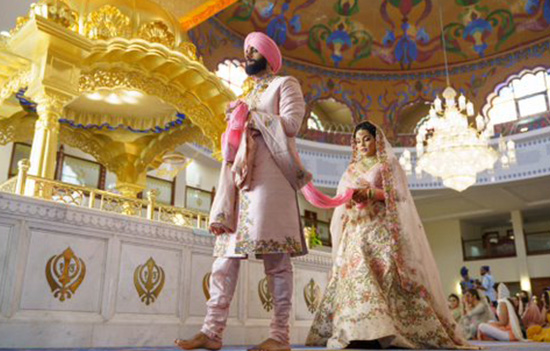 Sikh wedding.
Sikh wedding.
Q11. Do you have foreigners asking you to organize an
Indian Wedding?
KM Yes, when one of the partners is Indian.
Indian culture is a lot more vibrant and it doesn’t matter which side is Indian, whether the bride or the groom, but if one side is Indian then the wedding is generally going to be predominantly Indian. Indian weddings are filled with so many fun traditions and rituals so it completely makes sense.
Q12. Do Indian
weddings mainly have Indian guests or foreigners too? When it is foreigners how
do you satisfy their curiosity about the grand Indian wedding?
KM Both.
My couples are mainly from the US or UK so they have a
lot of foreign friends, neighbours and work colleagues who attend their
weddings.
Here is what we
do to make weddings inclusive for all guests.
1. The wedding website will have an itinerary with a
description of each event so that guests know what will happen and what to
expect.
2. We create mood boards with photos of what to wear at
each event and provide links to websites where they can buy traditional Indian
outfits.
3. I have a dedicated hospitality team who is always available to answer any questions guests may have before the wedding, whilst packing, etc and then we also have a desk set up during the events where they can come and ask for any advice they need – we
have also helped with saree tying when their YouTube videos aren’t making sense to them.
4. At the ceremonies, we will have an order of ceremony
with each ritual explained in English for guests to follow what is happening in
each moment.
5. Our priests speak fluent English and they explain the different ceremonies in English, making the wedding inclusive of all attending. These days an English-speaking Hindu priest has become a priority as most couples don’t speak good Hindi so they want to have someone who will explain the ceremony to them.
6. And the most important is to include them in the different events, whether that’s having them join the Sangeet performances or calling them up on the wedding stage to throw petals at the Pheras.
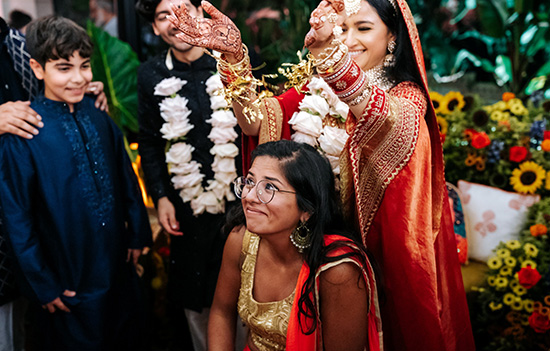 Kaleere ceremony.
Kaleere ceremony.
I got married recently and most of my
friends are non-Indians so during my Kaleere
ceremony I had all of them sit in front of me and I would try and drop the
Kaleere on them, and during my Haldi, I applied haldi on everyone, let them get
that bridal glow too.
Q13. Briefly, what
are the steps that go into organising an Indian wedding?
KM First,
we focus on finding the right venue for our couples. Indian weddings are large
affairs with many events and Indian food is key so finding a venue that can
accommodate these numbers and offer different event spaces usually takes around
three months. Once the venue is locked down, we send out the save the dates to
all guests and send them details so that they can book their rooms.
Next, we book the key suppliers such as photographer, videographer,
DJ, priest, HMUA (hair and make-up artist) for the bride, dhol players, and mehndi ladies.
Once all vendors are booked in with their deposits
paid, we start designing each event. We thrive to
make each wedding unique to our couples so it is a collaborative process
between my team and the couple. This is the fun part of wedding planning where
we get to know our couples and what they like and dislike. Every couple is so
unique and we are grateful to always be working with couples who have all these
different ideas. When the design is finalised with the costs approved,
production starts!
This is where I lose my work-life balance. I always
have to be available for any last-minute questions the suppliers may have.
We also visit the destination with the couple and their parents two months before the wedding to do the final walk-through and food tastings. We try every single dish that will be served at the wedding to ensure it’s perfect. We do rehearsals with the couple and their parents so they know where to be when.
The wedding is usually planned between me and the couple so I must explain everything to the parents so that they don’t feel lost on the days of the events.
And then it’s time to have fun! We are always the first ones to arrive at the destination, usually a day before the families arrive and the moment they do, it’s GO. Final wedding meetings, hamper packing, steaming, nail appointments, guests arriving, it’s non-stop for everyone until the first event starts - and then it’s just fun, for them! We don’t stop until we have sent everyone back again.
Q14. How do you organise the Pandit for the wedding, the musicians, mehndi and sangeet meaning are vendors available at each location?
KM Most specialist Indian vendors are flown in from the UK or India. Unfortunately, Europe doesn’t have many Indian vendors and if there are any, they usually don’t have much experience and my clients only want to have high-end professional suppliers. We have managed to find good Indian caterers in Spain, Portugal and Italy, however, Pandits, DJs, dhol players, mehndi ladies and specialist hair and makeup artists are always flown in.
Q15. Can you give three
qualities required to be a successful wedding planner?
KM
1. Excellent time management skills.
2. Detail oriented.
3. Good listener – this is one of the most important days of someone’s life, a once-in-a-lifetime event. You need to listen to your couple and give them their dream day.
Q16. What aspects of
Indian Culture do you highlight at weddings?
KM Guest hospitality. Indians have always said and believed that guests are a form of God and this is something my team and I adopted when we started. We do everything we can to make the guest experience a smooth one because if guests are happy, the couple and the family are going to be happy. It doesn’t matter if you spend tens of thousands on flowers or have the most incredible artist performing at your wedding, if your guests haven’t been picked up on time, that’s what they will remember and not your flowers. So our number one priority is that everyone is looked after. Guest hospitality is what we have always been known for.
Q17. Would you like to share an interesting wedding story?
KM I once had a couple who broke up 10 days before the wedding so I had to plan a “no wedding”.
We had so many guests still coming to the hotel as
they had already booked their flights, and time off from work so my client sent
me to the destination to look after them. We spent the entire week booking
tours and restaurants for guests. I remember the aunties would catch me in the
lobby and want to know why the couple broke up, but I had no clue and I had to
sit there listening to their theories.
Q18. What is the
average estimated cost of a wedding organised by you?
KM Our minimum spend starts at $100,000 for a 1-day
Indian wedding in the UK, and our average 3-day Indian destination wedding in
Europe with 250-300 guests costs $500,000, but there is no limit and we have
also done weddings of double that amount.
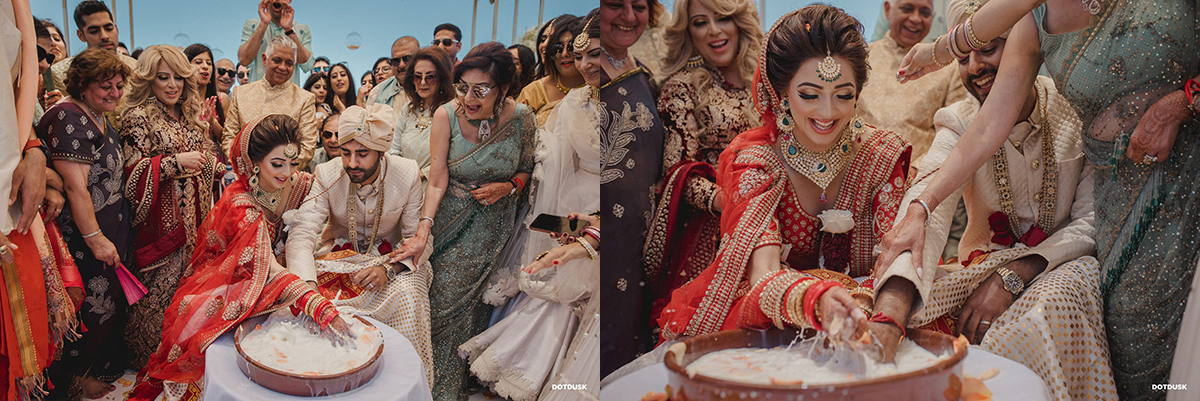 Koda Kodi
Koda Kodi
Koda Kodi. “A round tray is filled with a mixture of water, milk & vermillion. A ring is put in the thali (tray). The opaque color of the liquid makes it impossible to spot the ring. The couple is asked to find the ring by putting their hands into the liquid.”
Q19. What if a client does not pay up
for expenses after a wedding is over? How do you de-risk yourself? Has this
ever happened and how did you deal with it?
KM We
take all payments upfront, all fees and vendor costs are taken ahead of the
wedding date and we also hold a deposit for any expenses that may occur on the
day of the events.
There are always some extras for example they finished all alcohol by night in which case we buy the extra and bill the client after the wedding as we don’t like disturbing the families during the event days. But the larger chunk of the fees is cleared a few weeks before the wedding. Some clients try to negotiate this term in our contract, however, it’s a non-negotiable and we are happy to refuse the client.
Unfortunately, we have learnt the hard way, and have to protect ourselves, because once the wedding is over, they won’t pick up your calls or will invent problems and faults that never existed. I once had a client who said that the gadda (cushion) he was sitting on during the ceremony wasn’t soft enough for his liking, and deducted a large sum of money because of that.
Q20. For resident
Indians, a marriage certificate is important. Do you arrange one for your
Indian clients?
KM My couples have their civil wedding in their own country as it isn’t easy to get officially married in Europe. Most countries need one of the partners to be a resident or a national and some countries need you to be in the country a few times in the year to do the paperwork – my clients don’t have the time.
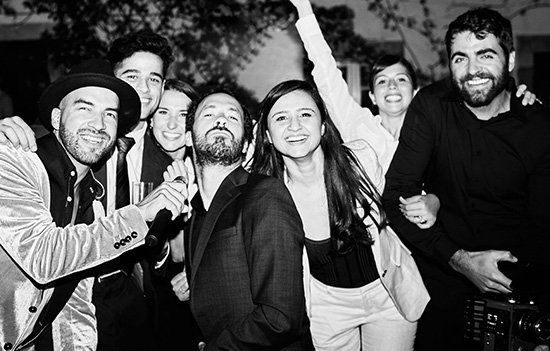 Karishma and her team.
Karishma and her team.
Q21. Weddings out of London require you to travel. How do
you maintain a work-life balance?
KM I take on a very limited number of weddings every year which means I don’t have to be away as much and we only work with couples who respect our time too. Our work is seasonal, summers are extremely busy where in all honesty, there is no balance but then winters are completely silent and that’s when I get to travel and spend quality time at home. I also have a very supportive husband who helps me when I am in peak season and he travels with me to the weddings too.
Q22. Do you encourage
and help guests to explore the wedding destination city e.g. Canary Islands?
KM Yes, always – we negotiate special rates with the hotel where the wedding is taking place not only for the days of the wedding but also for the days before and after so guests can benefit from these throughout their stay. We create a whole travel page on the wedding website with the must-see spots as well the best food places. Our dedicated hospitality desk assists guests in booking their tours and excursions. It’s nice to hear their stories when they return to the hotel. Sometimes we also organise an excursion for the whole wedding group.
Last year we kept one of the mornings
free and organised a whale-watching catamaran
excursion for everyone, they were able to relax and explore some of the
most scenic spots on the island. It enhances the whole wedding experience.
To know more about Karishma Manwani’s work visit her site
You can contact her at info@karishmamanwani.com Except pic 1 all pictures are courtesy and copyright Karisha M.
Also read
1. Gujarati Weddings
To read about wedding ceremonies of different Indian communities